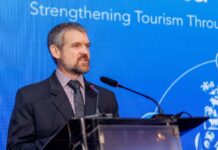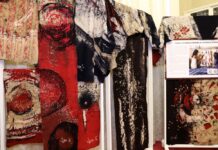On August 13th, a day after World Elephant Day, Listening To The Giants brought together a full house audience in Colombo for a rare and transformative gathering. The audience came to hear the fascinating truth about telepathic communication with elephants — knowledge previously unknown and unavailable, yet revealed as the missing and integrating link in solving Human-Elephant Conflict (HEC).
Conceptualized and co-created by Saha (practitioner of Quantum Healing Hypnosis Technique, Reconnective Healing, and brand strategist) and Dunja Will (renowned interspecies communicator and founder of Animal Assisted Intuitive Transformation, AAIT ), the evening was hosted by Cinnamon Grand Colombo in the heart of the city.
The event opened with The Animal Communicator, the globally acclaimed documentary by Anna Breytenbach, which left the audience visibly moved and receptive to a deeper truth: animals are sentient with voices we must listen to and conscious beings we can speak to.
Dunja Will shared her groundbreaking communications with both wild and captive elephants in Sri Lanka, revealing their emotions, perspectives, and solutions for coexistence. She recounted details of her conversations: elephants speaking of a shortage of a certain fruit tree in the forests, one asking for help with an unhealed foot wound, another sharing deeply personal information about its mahout, and even expressing a fondness for eating carrots. These stories, at once practical and profoundly intimate, revealed the depth of elephant consciousness and the necessity of listening to them as co-creators of solutions. Dunja emphasized the potential and possibilities that interspecies communication can bring in — inviting elephants to be in active dialogue in shaping true coexistence.
The panel brought together diverse voices:
Jehan CanagaRetna, Immediate Past President of the Wildlife and Nature Protection Society, offered grounded conservation insights with a sharp focus on practical impact. He spoke about legal matters, administrative bottlenecks, and initiatives designed to help villagers realize the economic benefits of conservation. His message was clear: coexistence must also be supported through policy innovation and community empowerment.
Vajira Wijegunawardane shared his observations on challenges and recommendations for better conservation, alongside his insights on how tourism income can support village communities. With over two decades of photographing Sri Lanka’s rare and elusive tuskers, he also presented ethical guidelines for elephant watching and photography. His moving tribute shocked the audience: more than 80% of the tuskers he had documented are now dead — in many cases, the only remaining evidence of their existence is his one and only series of photographs.
As the catalyst, Saha connected the dots, highlighting how elephants, like humans, carry trauma, how they pass it on to their offspring, and how trauma creates deviant behavior. He concluded the program by explaining that elephants mirror humanity’s disconnection — and that true coexistence begins with reconnecting to ourselves and to the quantum field of life that unites all species. The evening was a departure from the crisis-driven, activism-heavy narrative often surrounding conservation. Instead, it was intriguing, inspiring, and refreshingly hopeful — a turning point in how we relate to elephants and to all life.
This was not just another World Elephant Day event. A seed for a paradigm shift was planted. The message was bold and clear: The solutions to Human-Elephant Conflict will not be found in academic papers, behaviour analysis, or Newtonian science alone. They will emerge when we lead with consciousness — when we step into the quantum field with heart-centric intention, where entanglement, entrainment, and interconnectedness are lived realities. Listening To The Giants marked a historic step in redefining conservation — not through conflict, but through consciousness. It signals the beginning of a larger movement to reshape how humans and elephants coexist in Sri Lanka and beyond.
BY NELUM BUDDHADASA




